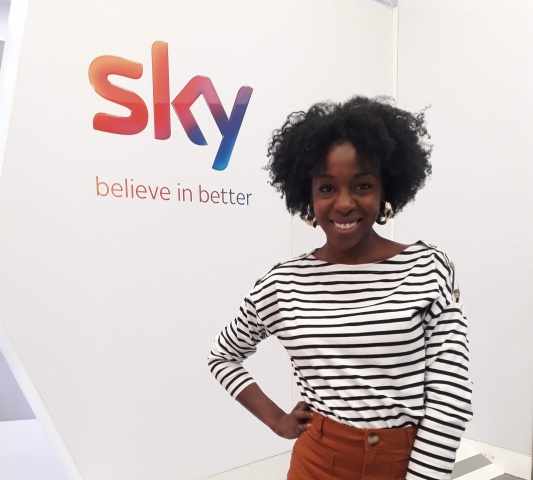Jacqueline Shepherd
Poppy Watt has the opportunity to interview Sky producer Jacqueline Shepherd in between her busy work schedule to discuss her life, career, and involvement with the MAMA Youth Project.
What were your ambitions as a young girl?
I was always creative, and I focused on the arts in education. But for fun, my sister and I used to make magazines; we’d write articles and create fashion looks for the pages. I also had a thing for reading CEEFAX out aloud as if I was newsreader, which was a geekier pastime of mine. I realise now that it demonstrates an innate desire to do what I have moved on to in adulthood!
What did you study at University and your thoughts on the whole university experience?
As mentioned, I focused on the arts in education. I had a love for textiles throughout school and college and studied Textile Design at university. Despite my enjoyment of textiles, media kept creeping into my sphere e.g. I wrote one of my end of year essays on the TV show Changing Rooms and always dreamt of presenting that programme.
I really enjoyed university, but not necessarily because I had the best educational experience, the enjoyment was down to making friends for life. I scored my best grades and was at my most creative in the first year where I was still unjaded and full of excitement for the future – I feel that I could have been more encouraged.
I have now rediscovered my love for textiles, perhaps because I do it on my terms, a bit like at the start of uni.
What inspired you to work in the media?
While at university there were two pivotal moments. I clearly recall walking down the street in Radford, Nottingham and having what seemed like a Eureka moment. It just came to me that I wanted to present. Growing up my mum had entered me into a public speaking competition, I was always public speaking representing the school in some capacity, and then there’s the magazines and CEEFAX thing; these are the clues that I think point me in the direction of media and broadcast. Not long after the Eureka moment, a friend of a friend needed someone to co-host a show on the university radio station, and that was my first taste of broadcasting. It was short-lived, but it confirmed my suspicions.
The other moment came later; there was a presenter search on Children’s ITV in my final year of university. You had to create a short video to enter, which I did and to my delight, I was shortlisted which meant I suddenly found myself in the studios in Birmingham filming my audition piece on set. I didn’t win, but the fact that I was shortlisted made me realise I had something and that presenting and working in media could be more than a pipedream.
How did your career begin?
Despite the CITV audition at the end of University, it was another 10 years before I actually took the leap and went for it in media. I was a recruitment consultant at the time and so saved up for a year knowing that when I changed industries, I would be taking a significant pay cut. I wrote to everyone I knew who had any slight link with TV, which resulted in working as a production runner for Matchbox TV. At the time they made the T4, ITV, and Channel 5 movie specials and I was like a sponge, absorbing everything I could about what was happening on the production. I was given more responsibility and eventually worked my way up to talent producer with them.
As I was freelancing, I was also able to work on other projects and I produced and hosted a show on Internet radio and presented a number of student productions.
I eventually had enough footage for a decent showreel and started getting paid presenting work. One day the opportunity came up to be a roving reporter on the new series of What’s Up, which was about to go onto Sky 3 (now Pick TV). I got the call as a result of working at the Internet radio station and my show-reel. That opportunity turned out to be career-changing!
Would you say it is a difficult career path to get into?
While I think it is difficult, the landscape has completely changed over the last decade making some strands of media much more accessible. Anyone can publish online via a blog or Twitter etc. and f your thing is presenting, there are a whole host of online platforms always looking for new faces, that didn’t exist when I was starting out. However – it is still a challenge to get through the doors to mainstream broadcast which is what I think a lot of people have their sights set on, which means it remains a tricky career path.
What part of your job role do you get the most satisfaction?
There is an element of training that I do in my full-time job as a producer and production trainer at MAMA Youth Project. Seeing a trainee transform by way of confidence from the start of production verses the end is extremely rewarding.
It is also extremely satisfying seeing an idea come to life on screen. When you recall the early conversations and the steps taken in order for you to arrive at the point of the director calling “action”, to finally seeing an edit come together, is really satisfying.
You have done voiceover work, is there any particular roles we would recognise your voice from?
You may have heard my voice on some of the Sainsbury’s radio adverts!
What is the MAMA Youth Project?
Mama Youth Project is a charitable organization that trains people from typically unrepresented groups or those who may have experienced challenges in their life, to enter the TV industry. The flagship training program is the What’s Up TV training which entails 14 weeks of training where trainees specialize in the areas of research, cameras, editing, sound or production management, all while making an actual broadcast TV show. The organization is a real example of how diversity and inclusion can be achieved in the industry and it is a real privilege to have worked with them over the years.
What is your typical day at work?
I’ve just finished producing the most recent series of What’s Up TV. The day is never completely typical but there are a few key things that I do. The day usually starts with a meeting where the team discusses stories unfolding in the media. Oftentimes, those stories will become items on the TV show. I will then meet with individual teams and their Assistant Producers to ensure that they have got enough irons in the fire and that their ideas are tangible yet original. I spend a lot of time reading briefs before giving them the green light to contact contributors. Sometimes I will have to negotiate with agents over access to artists and archive material and may need to follow this up by looking at amending our contracts and release forms as much as I can in my capacity. I will watch offline edits and give them the thumbs up and online edits alongside the executive producer.
All the while, I am also doing appraisals and training sessions to ensure that the trainees are well equipped with the support and knowledge they need to undertake their job!
What do you like to do outside of work to relax?
I love spending time with family in Cornwall. If I’m able, I enjoy a beach holiday and exploring, sunbathing and eating; and I’m a sucker for an art exhibition. I am very happy whiling away the day in a gallery.
Tell me about your role as the ‘Natural Hair Ambassador’ are you still involved?
I was given this title by a newspaper a few years back, but I think the shoe still fits. Natural Afro hair for a long time has been deemed unprofessional and unattractive and over the last few years, there has been a real movement in bloggers, influencers, black-owned hair brands and individuals like myself in media, bucking that negative idea, by embracing and celebrating natural hair. Even if I am not formally being an ambassador on a stage talking natural hair, I am doing my best to represent and demonstrate that natural hair is more than okay – it’s beautiful!
Poppy Watt


